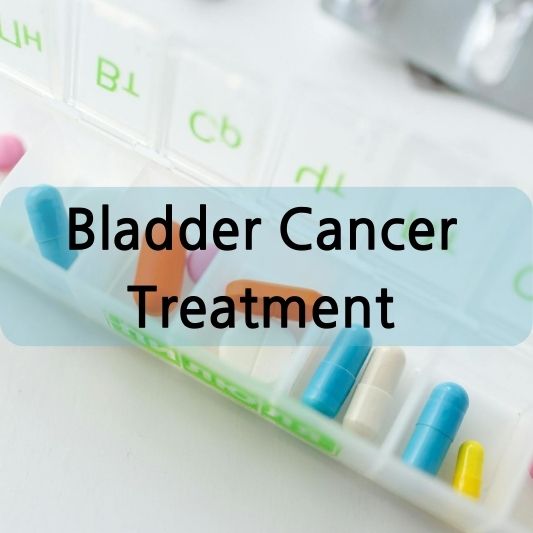Bladder cancer is a condition characterized by the abnormal growth of cells within the bladder, a hollow organ located in the pelvis responsible for storing urine before it is excreted from the body. This article aims to provide comprehensive insights into bladder cancer treatment options, ranging from conventional therapies to emerging treatments and supportive care strategies.

Types of Bladder Cancer
Bladder cancer can be broadly categorized into several types, including transitional cell carcinoma (TCC), squamous cell carcinoma, and adenocarcinoma. Transitional cell carcinoma accounts for the majority of bladder cancer cases and originates from the transitional epithelial cells lining the bladder.
Symptoms and Diagnosis
Symptoms of bladder cancer may include blood in the urine (hematuria), frequent urination, pelvic pain, and urinary tract infections. Diagnosis often involves a combination of medical history review, physical examination, imaging tests (such as CT scans and ultrasounds), and urine tests to detect cancer cells or proteins.
Risk Factors
Several factors may increase the risk of developing bladder cancer, including smoking, exposure to certain chemicals (such as arsenic and aromatic amines), chronic bladder inflammation, and a family history of the disease.
Treatment Options
Surgery
Surgery is a primary treatment modality for bladder cancer and may involve transurethral resection of bladder tumor (TURBT), partial cystectomy, radical cystectomy (removal of the entire bladder), or urinary diversion procedures.
Chemotherapy
Chemotherapy utilizes drugs to kill cancer cells or inhibit their growth and may be administered intravesically (directly into the bladder) or systemically (through the bloodstream).
Immunotherapy
Immunotherapy harnesses the body’s immune system to target and destroy cancer cells. Immune checkpoint inhibitors, such as pembrolizumab and atezolizumab, are among the immunotherapeutic agents used in treating advanced bladder cancer.
Radiation Therapy
Radiation therapy employs high-energy rays to kill cancer cells or shrink tumors and may be used as a primary treatment or in combination with surgery and chemotherapy.
Clinical Trials
Participation in clinical trials allows patients to access novel therapies and contribute to the advancement of bladder cancer treatment. Clinical trials evaluate the safety and efficacy of new drugs, treatment approaches, and supportive care interventions.
Coping and Support
Living with bladder cancer can pose significant challenges, both physically and emotionally. Patients and their families may benefit from support groups, counseling services, and educational resources aimed at addressing the psychosocial aspects of cancer care.
Prognosis
The prognosis for bladder cancer varies depending on factors such as the stage of the disease, the aggressiveness of the tumor, and the patient’s overall health. Early detection and timely intervention play a crucial role in improving outcomes and quality of life.
Prevention
While certain risk factors for bladder cancer, such as age and genetic predisposition, cannot be modified, adopting a healthy lifestyle and avoiding exposure to carcinogens can help reduce the risk of developing the disease. Strategies may include smoking cessation, maintaining a balanced diet, staying hydrated, and practicing good bladder health habits.
Living with Bladder Cancer
Adjusting to life after a bladder cancer diagnosis involves making lifestyle modifications, adhering to treatment regimens, and prioritizing self-care. Open communication with healthcare providers, adherence to follow-up appointments, and proactive symptom management are essential components of long-term disease management.
Future Outlook
Ongoing research efforts seek to improve treatment outcomes and quality of life for individuals affected by bladder cancer. Advancements in precision medicine, targeted therapies, and molecular diagnostics hold promise for personalized approaches to bladder cancer management in the future.
Conclusion
In conclusion, bladder cancer treatment encompasses a multidisciplinary approach aimed at maximizing therapeutic efficacy while minimizing treatment-related side effects. By staying informed, proactive, and engaged in their care, individuals affected by bladder cancer can navigate their journey with resilience and hope.
FAQs
Is bladder cancer curable?
While the prognosis for bladder cancer varies, early detection and prompt treatment can improve outcomes. Some cases of bladder cancer are curable, especially if diagnosed at an early stage.
What are the side effects of chemotherapy for bladder cancer?
Common side effects of chemotherapy may include nausea, vomiting, fatigue, hair loss, and increased susceptibility to infections.
Are there alternative therapies for bladder cancer?
Some individuals may explore complementary and alternative therapies, such as acupuncture, herbal supplements, and mind-body techniques, to complement conventional treatments. However, it is essential to discuss these options with healthcare providers to ensure safety and efficacy.
Can bladder cancer recur after treatment?
Yes, bladder cancer can recur even after successful treatment. Regular follow-up appointments and surveillance tests are crucial for monitoring disease progression and detecting recurrence early.
How can family members support a loved one with bladder cancer?
Family members can offer emotional support, accompany their loved one to medical appointments, assist with daily tasks, and actively participate in caregiving responsibilities to provide comfort and encouragement throughout the treatment journey.
Learn more about bladder cancer!
